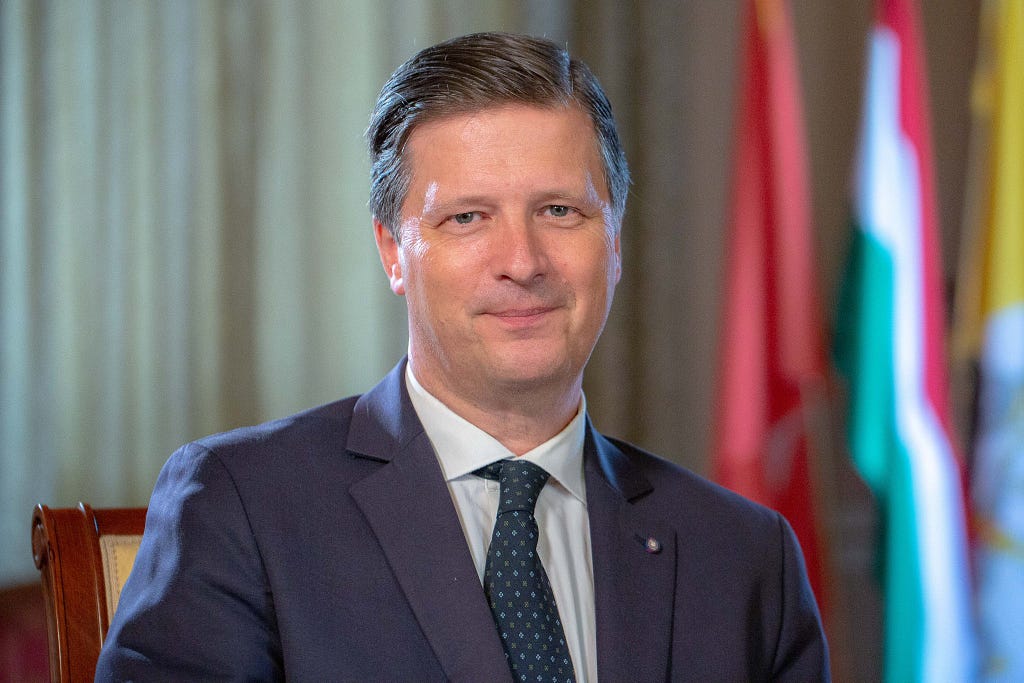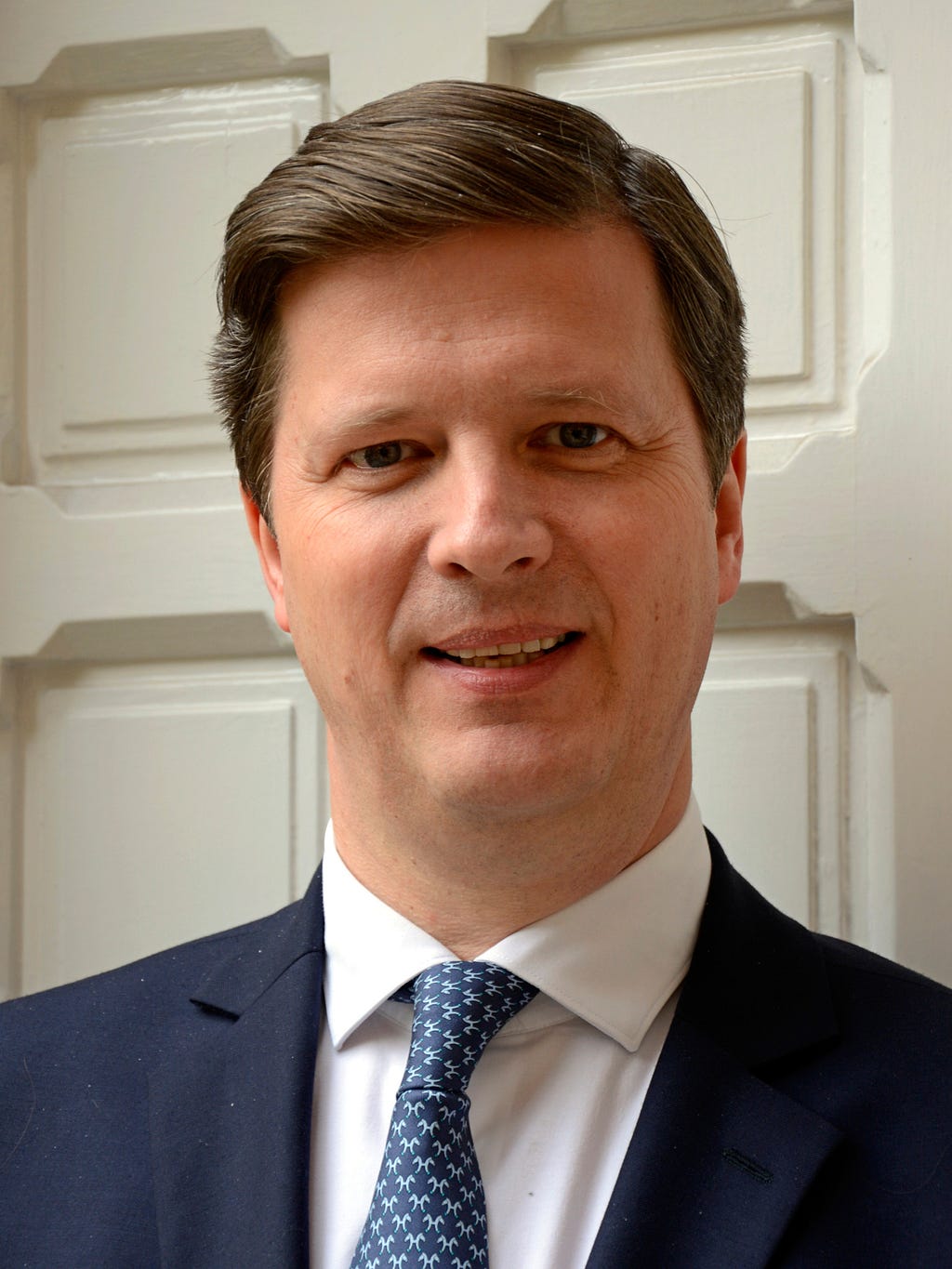Archduke Eduard of Austria, Eduard Habsburg: Seven Things You Need To Be A Highly Effective Leader During Uncertain & Turbulent Times

It is great to have, so to speak, a ready made identity when you grow up. It is wonderful to be connected to such a long line of famous personalities that were, for the most part, good and upright Christians and rulers. It is wonderful to have a cousin in most of the cities of Europe and many of the world.
As part of our series about the “Five Things You Need To Be A Highly Effective Leader During Turbulent Times”, we had the pleasure of interviewingEduard Habsburg.
Eduard Habsburg is Hungary’s ambassador to the Holy See and the Sovereign Order of Malta. His family reigned in Austria, Hungary, Germany, Spain (and quite a few other places). Also known as Archduke Eduard of Austria, he is a diplomat and social media personality. Eduard and his wife, Baroness Maria Theresia von Gudenus, have six children. Eduard is the author of several books, including the children’s book Dubbie: The Double-Headed Eagle; volumes on Thomas Aquinas, James Bond, and Harry Potter; novels; and screenplays.
Thank you so much for your time! I know that you are a very busy person. Our readers would love to “get to know you” a bit better. Can you tell us a bit about your ‘backstory’ and how you got started?
I was born in Munich, Germany, as the son of a Habsburg from the Hungarian branch of the family. I studied philosophy and Thomas Aquinas before getting married and working in television, where I produced animated cartoons for a while. As my six children arrived in our Habsburg household, I began writing screenplays and later worked as a spokesman for a Catholic Bishop in Austria. Since 2015, I have been serving as the Hungarian Ambassador to the Holy See. I have a deep love for the United States, and a large portion of my 58,000 Twitter followers are likely Americans. In addition to THE HABSBURG WAY, I have authored a children’s book in English about a double-headed eagle, along with several novels and other books in German.
How is it to grow up as a member of a 1000 year old family? I can imagine that can lead to weird situations?
Indeed you are right! While it is fantastic to belong such a famous and old family, becoming a Habsburg is a totally different matter. The first time you realize you belong to something different is in school. As the Habsburgs appear in almost every year since 1273 in European history, the teacher will regularly end a sentence by saying “but I am sure Mr. Habsburg knows ALL about this”. At which point everybody in class turns around to you, and Mr Habsburg usually blushes and tries to hide in the last row of the class, because no, he has not been born with a perfect knowledge of the family history.
But the positive part is this usually motivates you to learn more about your family. You ask your parents and you take out the history book from the bookshelf. Next time, you won’t look so stupid.
Did you learn about your family history from books, or were there particular persons that helped you “shape your identity”?
Books are indeed an important part at the beginning; I wish such a book as my THE HABSBURG WAY would have existed in my childhood. But of course you talk a lot, first to your parents, then to elderly uncles and aunts. If you belong to such an old family you are able to “reach back” quite a while. I will give you a practical example. My great-grandfather married a grand-daughter of emperor Francis Joseph. Which means that my father grew up with stories of that man who became emperor in 1848. I would say that this gives you a certain horizon from early childhood.
Two members of my family have heavily impressed me in my youth. One of those was Otto von Habsburg, son of the last emperor of Austria and tireless fighter for European Union and against communism. The other was the last empress of Austria, Zita, whom I still had the honor to meet as a child and speak with. The encounter with her gave me a personal access to the last years of the Austro-Hungarian empire.
What does being a Habsburg mean for you today? What does it mean to other members of your family?
If you are a Habsburg you will grow up with a tiny spotlight attached above your head. People will notice what you do far more. The way my father taught me to deal with this is: you have a responsibility for society. People expect a certain behavior and certain values from you because you are Habsburg. Some of these values are self evident, and I speak about them in my book. Family values, my faith as a Christian; others you discover while you grow up — for instance standing for peaceful coexistence between nations. This is the reason why I decided to become Ambassador, and several cousins did the same. But be also have priests, nurses, family mothers, bankers, farmers…. In fact you will find family members in most walks of life. We are a family of about 400 members that live all over the world, and so you can imagine that many of us out different of the Habsburg values as the focus of their lives. But everyone of us is shaped by the fact that they are a member of this family.
Are the about 400 Habsburgs today a unity? Do you regularly meet? Do you exchange opinions, have a forum??
It will not surprise you to know that the Habsburg family has a WhatsApp group where many of us meet daily. There we post about events, births and deaths, articles about our family and very rarely cat pictures. This is one way for as to meet, because we are spread all over the world and can rarely get together all of us in one place.
However we do family meetings from time to time and they are usually quite spectacular. For instance, in 2016 we went to Rome and met with Pope Francis — there were 340 of us. Last year for the centenary of the death of Blessed Emperor Karl we met in Madeira.
What are books that have shaped your ideas about the Habsburg? Which books should I read (AFTER having read yours) that will help to shape our understanding even better?
My entry drug into family history were two biographies by Egon Cesar Conte Corti on Emperor Franz Joseph and Empress Elisabeth. But the real game-changer was Dorothy Gies McGuigan THE HABSBURGS, a really charming approach to our family history from the 1950s.
Today I would recommend Martyn Randy’s new comprehensive book on our family, THE HABSBURGS, and Charles Coulombe’s book on Blessed Emperor Charles.
What are the difficult sides in being a Habsburg? Do you encounter anger? Derision?
On the one hand, it is great to have, so to speak, a ready made identity when you grow up. It is wonderful to be connected to such a long line of famous personalities that were, for the most part, good and upright Christians and rulers. It is wonderful to have a cousin in most of the cities of Europe and many of the world.
A downside is that I regularly get pelted with Habsburg jaw, inbreeding jokes on Twitter, and get the odd veiled death threats with pictures of Gavrilo Princip, the assassin of Sarajevo, or the dead body of Maximilian of Mexico.
So is it more positive or negative? Largely more positive, of course. But in general people pay more attention to me — whatever I do, good or bad, it will be more noticed. And if I do something bad it will be most probably “Habsburg family member did this or that”.

What is the style of your head of family, Karl Habsburg? What are his “powers”, how does he lead?
Karl Habsburg is passionately engaged in saving cultural heritage, especially in zones of war, through his organization Blue Shield. He also participates radio stations in different countries, e.g. in Ukraine. If this was a soccer match I would say his style is like that of Franz Beckenbauer, leading the team from the middle of the field. He does not have to be flamboyantly in the center of the stage, or to remain in soccer language, to score the goals. He is a real team player in that he appreciates what other can contribute to the family.
Can you share 3 or 4 of the most common things people get wrong about the Habsburg family? Can you imagine how these mistakes come about?
We don’t marry our cousins — this prejudice stems from the stories about the intermarrying between the Austrian and Spanish line of the Habsburgs; but guys, give me a break, that was 400 years ago. OK, Franz Joseph married his first cousin, Elisabeth, but that was 130 years ago.
We didn’t start the First World War. Franz Joseph played an important role through the ultimatum to Serbia, after the assassination of the Habsburg heir to the throne; but for the war to start a whole series of people in different countries had to participate. As shown by Christopher Clark’s brilliant book THE SLEEPWALKERS.
And we don’t live in castles any more. Well, most of us. I certainly don’t.
What are the values that keep your family active, hopeful of the future, in complicated times like the ones we live in?
That would still be the 7 principles that I outlined in my book THE HABSBURG WAY: Get Married (and Have Lots of Children), Be Catholic (and Practice Your Faith), Believe in the Empire (and in Subsidiarity), Stand for Law and Justice (and Your Subjects), Know Who You Are (and Live Accordingly), Be Brave in Battle (or Have a Great General) and, most of all,
Die Well (and Have a Memorable Funeral). There is no Empire as we speak, so we don’t have subjects any more, and courage can be shown in other battlefields than the one in war. But the rules still apply.
How did you develop the “7 Rules for turbulent times” of your book? Is this an official family position?
The seven rules are the fruit of reading, talking with family members and historians and lots of thinking. Much of it has been traced by others, beforehand, but my synthesis is the first time someone tries to turn Habsburg values into a self-help book. And therefor, this is NOT the official Habsburg position but probably quite close to it.
Should everyone live according to the “Habsburg way”? And why?
This is the point of the book. I would encourage everybody, our society, and also (last but not least) our political world to take a look at the “7 rules”. Why? To say it in a corny way: Because I believe the world would be a better place if they did.
How can our readers further follow your work?
Follow my Twitter account @EduardHabsburg
This was very meaningful, thank you so much!
Archduke Eduard of Austria, Eduard Habsburg: Seven Things You Need To Be A Highly Effective Leader… was originally published in Authority Magazine on Medium, where people are continuing the conversation by highlighting and responding to this story.
